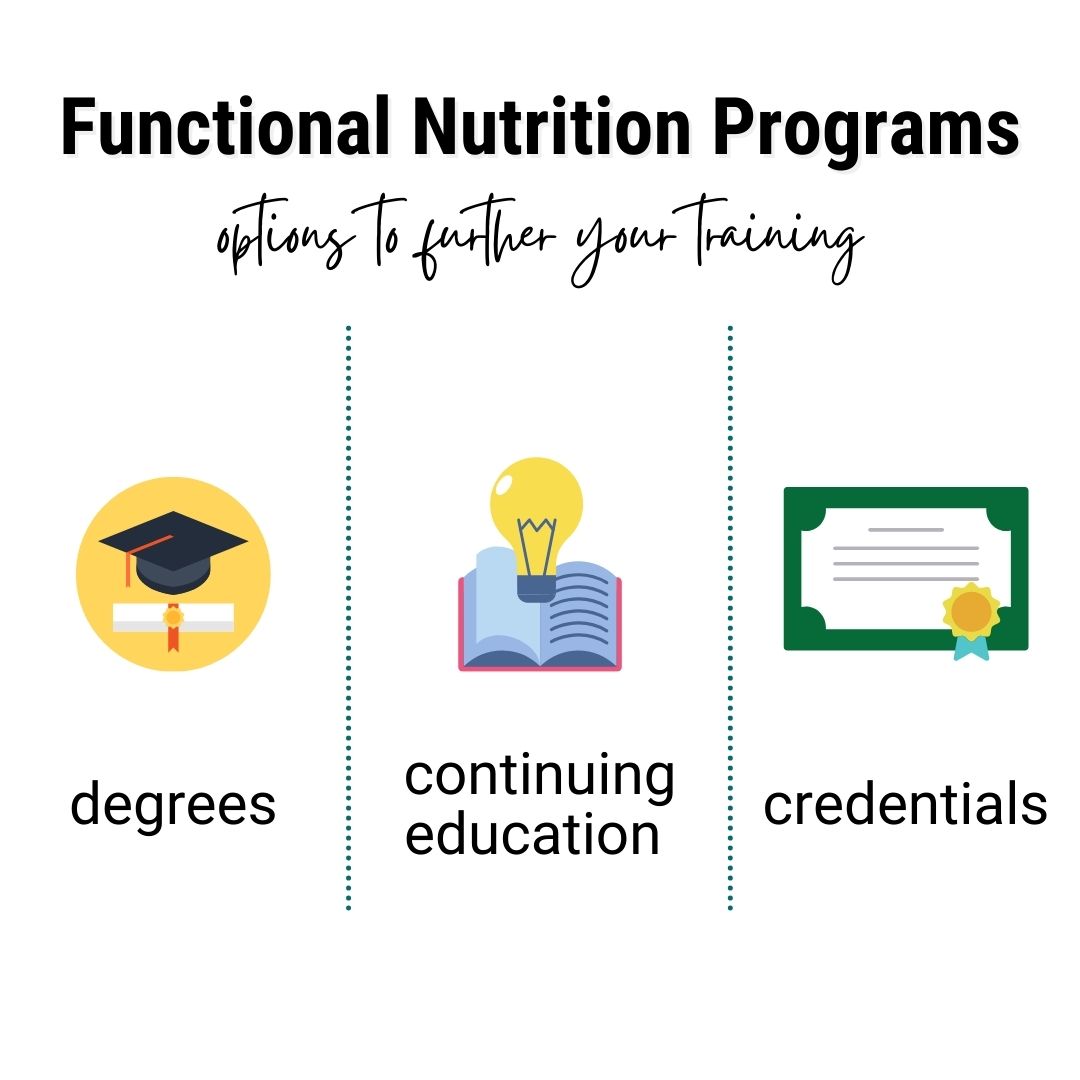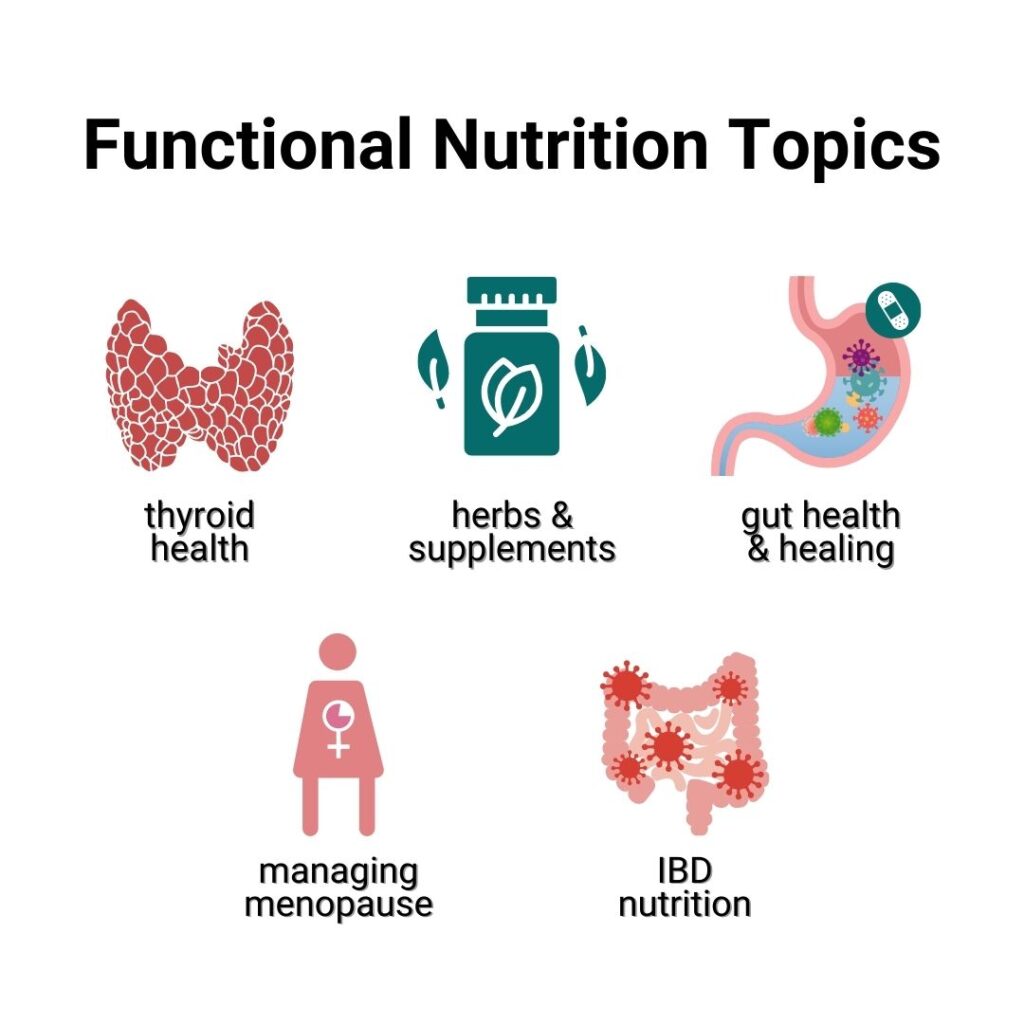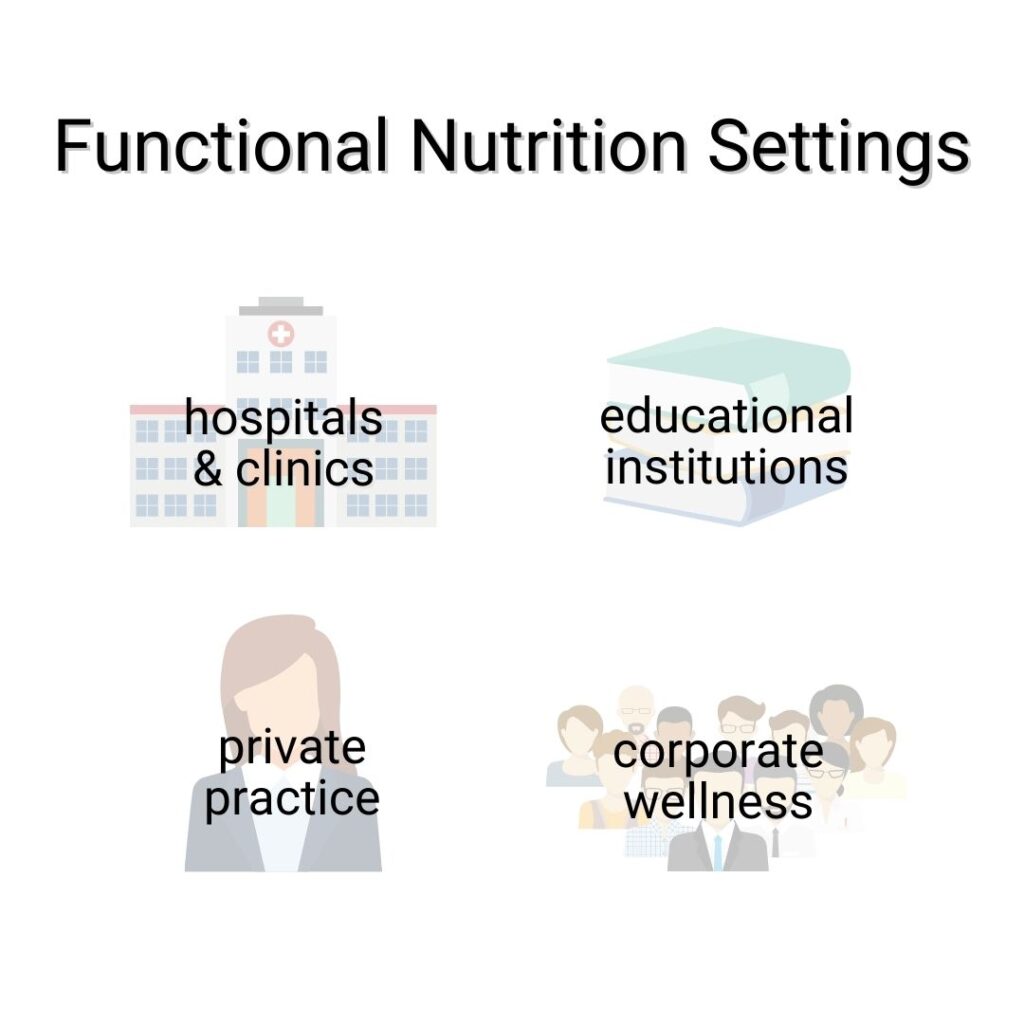Hey there RDs – are you looking for a functional nutrition certification, one that can set you on your path towards becoming a functional nutritionist?
Or just wondering what a functional nutritionist is?
This post covers it all! What a functional nutritionist is, how that differs from the traditional roles that registered dietitians have, and the best options available for functional nutrition certification and trainings. There are a lot of options!
Disclosure: contains affiliate links. As an affiliate, WellResourced earns a commission on qualifying purchases at no cost to you.

What is a functional nutritionist?
Functional medicine, including functional nutrition, is a different approach to patient care than how many dietitians have been traditionally trained.
In traditional dietitian training programs, the education is centered around disease diagnosis and the management of those diseases. For example, using the DASH diet to manage hypertension or the low-FODMAP diet to curb symptoms of IBS. In general, there are standard protocols of care, and treatment is focused on symptom management.
In contrast, with functional nutrition, the approach is more about cultivating health than disease management. The approach tends to see the body as an interconnected whole, with all systems interacting and influencing one another. In the functional-nutrition paradigm, an imbalance in one body system will have an impact on the rest of the body.
Functional nutrition is also about getting down to the root cause of issues. A functional nutrition dietitian doesn’t just acknowledge a diagnosis of IBS, they will ask “why” and work to identify the root cause. And then, create a personalized treatment protocol to fix it.
The two approaches – traditional and functional nutrition – are on a spectrum. It is absolutely possible for nutrition professionals to be somewhere in between, incorporating both approaches into their nutrition care.
And in either case, the goal is always to optimize the patient’s outcome. Both approaches are geared towards improving the health and wellness of their clients, they’re simply approaching the issue from different angles.

Best functional nutrition certifications
The good news is that whether you’re interested in dipping your toes into the functional nutrition waters or doing a full cannonball into this realm, there’s a wide range of options to choose from.
In this section, we begin with full-length degrees and intensive programs. We continue with introductory program. At either end of the spectrum, you can further your training in the way that best suits your goals, budget, and bandwidth.
Here are a few of our favorite functional nutrition certifications.
Integrative and Functional Nutrition (IFN) Academy
The Integrative and Functional Nutrition Academy offers a 5 track educational training on integrative and functional medical nutrition therapy. This program is a full comprehensive way to learn about what functional nutrition is, how it all works, systems biology, labs, supplements, diet, treatment protocols and up to date research in the field.
The IFNA trainings have been a crowd favorite for many dietitians. IFNA offers several pathways through their training programs, depending on your personal goals.
Continuing Education
You have the option to move through the extensive course modules, at your own pace, and earn up to 220 hours of CPE.
The fees are charged individually for each track. There is a discount if you’re an IFNA member.
- Track 1 – $647
- Track 2 – $1779
- Track 3 – $1279
- Track 4 – $977
- Track 5 – $879
Certificate of Training
In addition to completing all tracks within 24 months, students have to pass the included tests.
Integrative and Functional Nutrition Certified Practitioner (IFNCP)
In addition to the modules and exam for the certificate of training program, students must also pass the IFNCP Credential Board Exam.
- Tuition for IFNCP Application – $149
- Tuition for IFNCP Credential Exam – $399
Students have the option to purchase a review prep course for $299.
Students must be registered dietitians, dietetic interns, or other healthcare professionals to be eligible for the certificate of training program or the certified practitioner.

Bastyr University
Bastyr University is known for their ‘whole foods’ approach to nutrition and offer a few different bachelor’s and master’s degree options. Their focus areas include culinary nutrition and exercise science.
They also offer a 10-month internship program that meets the eligibility requirements to sit for the board exam towards becoming a registered dietitian nutritionist. There are two focus options: integrative nutrition and environmentally conscious, whole-foods nutrition.
Classes take place in person. Fees for each degree option are based on cost per credit.
In addition to academic degrees, Bastryr also offers on-demand continuing education geared toward functional and holistic approaches to health. Review their full calendar here and this series (3 CEUs) on nutrition topics like ‘Integrative & Functional Nutritional Approach to Hashimoto’s Thyroiditis.”
Next Level Functional Nutrition
The Next Level Functional Nutrition training programs were created by Susan Allen-Evenson RDN, CCN, FMNS.
Next level Functional Nutrition offers an introductory course, Introduction to Integrative and Functional Medical Nutrition Therapy (IFMNT) that is approved for 10 hours of CPE. The introductory course is the prerequisite for their certificate of training program.
Once you complete the introductory course, you are eligible to participate in the Certificate of Training (COT) program in Integrative and Functional Medical Nutrition Therapy (IFMNT).
In either case, registration is limited to licensed or professional healthcare workers, including registered dietitians.
In addition to the formal training programs offered by Next Level, members also have access to the on-demand webinar recordings. Pricing for these training programs is not listed on their website.
University of Western States
The University of Western States offers one example of more rigorous training for those who are all in for functional nutrition training; they offer a graduate certificate program, a master’s, and a doctorate program.
Each program has required classes and charges by the credit hour; your total tuition would vary depending on the program level that you picked and any classes that you already had credit for.
All three programs are 100% virtual. You do not need to be a registered dietitian, but you must have a degree in a related field for the master’s and doctoral programs.
John Patrick University of Health and Applied Sciences
Similar to the University of Western States, John Patrick University offers a graduate certificate program, a bachelor’s program as well as master’s program in functional nutrition.
The master’s program allows students to choose their focus concentration with choices including Cannabinoid Medical Sciences, Lifestyle Medicine, Nutrition, and Sports Medicine. You must have a bachelor’s degree in a related field to be eligible to apply.
The DIFM Practice Group Certificate of Training Program
The Dietitians in Integrative and Functional Medicine practice group, DIFM for short, offers a 5-module introductory course in functional nutrition. This program is intended for registered dietitians who wish to further their functional nutrition knowledge.
Each module builds on the knowledge gained in the previous one. The training includes the opportunity to apply the skills and knowledge, furthering your understanding and retention.
The five modules cover the following topics:
- Module 1: Introduction to Integrative and Functional Nutrition
- Module 2: Digestive Health
- Module 3: Environmental Toxins, Exposure, and Elimination
- Module 4: Inflammation
- Module 5: Dietary Supplements
Each module is $54 (or $24 of Academy members) and is eligible for 2 CEUs (at the time of publication).
The Functional Nutrition Alliance
The Functional Nutrition Alliance (FxNA) was founded by Andrea Nakayama, a Functional Medicine Nutritionist. Andrea is a Certified Nutrition Educator (CNE) and Certified Nutrition Counselor (CNC) and has completed her Master’s of Human Nutrition & Functional Medicine.
The FxNA offers two training programs that are intended for healthcare professionals, but there are no specific prerequisites to take the trainings.
Their signature program – Full Body Systems – is a 10-month program and explores the seven key body systems: digestive, immune, urinary, cardiovascular, endocrine, nervous, and reproductive.
Weekly classes are 2-hours long and have both lecture and interactive activities. Once you’ve completed the training and passed the exam, you will be certified as a Functional Nutrition Alliance Certified Functional Nutrition Counselor (CFNC).
Payment plans are available. The lowest cost for this program is if paid in full and is $5,299. This training is not approved for CEUs for registered dietitians.
The American Nutrition Association
The American Nutrition Association is the professional organization for the Certified Nutrition Specialist (CNS) credential, one that is similar in scope and difficulty to becoming a registered dietitian.
The CNS certification has a greater focus on functional nutrition training than the typical program for becoming a registered dietitian. If you’re not already a registered dietitian, this training is an alternative route towards becoming a credentialed expert.
In addition, you can find information about various specialized personal nutrition training programs such as Ketogenic Nutrition, Nutritional Genomics, and Fasting Lifestyle Certificate Program.
Andrew Weil Center for Integrative Medicine
The Andrew Weil Center for Integrative offers a wide variety of courses that are approved for continuing education for healthcare professionals, including dietitians. Their courses range from shorter, 1-hour webinars to longer, in-depth courses for several hours, such as the Anti-Inflammatory Diet, Nutrition and Cancer and Nutrition and Cardiovascular Health.
Another option is their Wellness & Lifestyle training course, which covers five modules of information priced at $653.56 per module. Taking that a step further, the Andrew Weil Center offers a Coaching certification program using these modules and more. To be eligible, you must have a bachelor’s degree. This training program includes live zoom sessions as well as self-directed study sessions.
Kansas University Dietetics and Integrative Medicine Graduate Certificate
This functional nutrition certification training program is a bit shorter than some of the other college-level courses that we’ve explored so far. The program is four classes long, with one course taken each semester. The courses are Dietary and Herbal Supplements, Introduction to Dietetics and Integrative Medicine, A Nutrition Approach to Inflammation and Immune Regulation and Nutrigenomics and Nutrigenetics in Health and Disease.
This program is virtual and is 12 credit hours long. Fees per credit hour vary if you’re in-state or out of state, from $421.15 to $989.60 per hour.
In order to be eligible to apply, students must have a bachelor’s degree in a related field that included a medical nutrition therapy course.
What if you’re looking for a smaller opportunity to explore functional nutrition? We’ve got you covered in the next section.

Additional functional medicine trainings and resources
If you’re looking for a smaller taste of what functional nutrition is, or training on a specific aspect of functional nutrition, the following learning opportunities are going to be right up your alley.
Mastering Gut Healing
Mastering Gut Healing created by functional medicine dietitian Dianne Rishikof, MS, RDN, LDN, IFNCP. The course for dietitians and other healthcare professionals focuses on how to use functional nutrition to improve patients’ gut health. A large number of conditions are covered, and the treatment framework is the 5R protocol for gut healing, which is an acronym for Remove, Replace, Repair, Reinoculate, and Relax. The is a 9 module self-study course. There are info-packed webinars, practitioner protocols, patient handouts, 900+ research citations, cheat sheets for troubleshooting tough cases, and tools for using supplements and diet.
If you are at all interested in digestive health, this course is for you. In depth and comprehensive, for beginners and experienced RDs alike, it is designed to provide clarity and confidence in healing gut disorders.
The cost of Mastering Gut Healing is $299.
The training is not eligible for CEUs.
The Ultimate Online Education for Dietitians Treating IBD Patients
Created by IBD Nutrition Experts, Colleen Webb, MS, RDN, and Ryan Warren, MS, RDN, this course is the ultimate online nutrition education for dietitians and other healthcare professionals treating patients with Crohn’s disease and ulcerative colitis.
Millions of people with inflammatory bowel disease struggle to eat and enjoy food, and they need help from knowledgeable professionals. This comprehensive, self-paced course will arm you with the tools and confidence to help your IBD patients feel better using food and nutrition. The integration of readings, mini-videos, diagrams and images keeps the course interesting and appeals to many learning styles.
Approved for 10 CEUs by the CDR, so you can earn credits while building your IBD knowledge, changing lives and opening doors to new professional opportunities.
The cost of IBD Nutrition School is $349.
Gaia Herbs
Gaia is a supplement company providing high-quality products as well as healthcare practitioner training. You have to create a free account in order to access their training materials and webinars.
These webinars are not approved for CEUs for registered dietitians.
Pure Encapsulations
Pure Encapsulations is a brand of high-quality vitamin, mineral, and nutritional supplements. They offer on-demand and live webinars on a range of topics.
The webinars are complimentary; they do not offer CEUs.
Navigating Menopause with Integrative Nutrition and Lifestyle Approaches
Dietitian Central offers many continuing education opportunities for dietitians, inclusive of Functional nutrition. Navigating Menopause is one such example!
This on-demand course is taught by Mary Purdy and teaches dietitians how to implement dietary and lifestyle strategies to manage menopausal symptoms and the associated health concerns. This course costs $18 and is eligible for 1 hour of CPE (until Feb 04, 2024).
An Integrative and Functional Approach to Hashimoto’s Thyroiditis
Bastyr University offers a 1-hour continuing education webinar available on-demand. This course is approved for 1 hour of CPE and is hosted by Mary Purdy, Registered Dietitian and adjunct faculty at Bastyr University.
This webinar guides students through strategies that support both thyroid function and the immune system, including dietary changes and supplementation. The cost is $50, with discounts available for students.
DIFM Practice group
We mentioned the DIFM practice group certificate of training program in the previous section. If you’re a dietitian interested in functional nutrition, this is the practice group for you.
Not only does membership grant you access to many resources through their membership page, but you can also join the listserv to ask questions as you work with clients from a functional nutrition perspective.
Potentially one of the most valuable membership perks is free access to the Natural Medicines Database, an incredibly robust resource about the latest research on safety and efficacy for supplements of all kinds.
The Functional Nutrition Forum (Licensed Healthcare Practitioners Only)
This is a closed Facebook group for those practicing functional nutrition who are licensed. You must request to join.
Why consider joining? Having a place to ask questions and continue to learn is invaluable.

Common questions
Here are a few common questions that are asked about training to become a functional nutritionist, and the work that they do.
Where do functional nutritionists work?
Functional nutritionists work in a variety of settings, including private practice, hospitals, corporate wellness, etc.
Do you have to be a dietitian to become a functional nutritionist?
No: the pre-requisites towards becoming a functional nutritionist vary by the training program.
How long does it take to become a functional nutritionist?
Training length of time depends on which functional nutritionist program you’re completing. Your options range from a short introductory program of a few weeks up to a doctorate program of several years.
What is the total cost to become a functional nutritionist?
The cost of becoming a functional nutritionist depends on the training path you’re pursuing as well as the prerequisites completed. The cost of a short weekend program might be a few hundred dollars while a Ph.D. program will cost many thousands of dollars.
The DIFM Practice Group Certificate of Training Program, one popular program chosen by dietitians, costs $120 to complete and takes 10-20 hours to complete.
Practice resources
Once you are on your way on your path towards becoming a functional medicine dietitian, you may feel a little intimidated about starting to practice in the field. There are tons of resources available right here that can help. Here are a few available on our site:
- Health Takes Guts® Your Comprehensive Guide to Eliminating Digestive Issues, Anxiety, and Fatigue – this 135 page eBook is a comprehensive guide for anyone looking to further their functional nutrition knowledge. This resource includes a comprehensive guide to the 5R protocol, elimination diets, a supplement guide as well as case studies to learn and practice from.
- Protocol for Treating Small Intestinal Bacterial Overgrowth – this guide provides you with the supplements, lifestyle, and nutritional recommendations necessary to help your clients achieve SIBO remission.
- An Introduction to Gut Health – this 60-minute customizable presentation covers research-backed, easy-to-read information including what gut health is and its connection to the rest of our body systems, the microbiome, as well as interventions to optimize gut health.
Key Takeaways: Best Functional Nutrition Certifications
As you can see, there are many paths forward towards expanding your knowledge as a functional nutritionist. You can try a few on-demand courses, for free, to see if this methodology of practicing nutrition is a good fit for you and the work that serves you best.
And if you decide that you love it, there are many levels of training programs to keep learning, depending on your budget, professional goals, and availability to study. The sky’s the limit!







One comment
Nice review, but another one worth mentioning is Erin Holt’s functional nutrition training. I have not taken her course but it looks good.